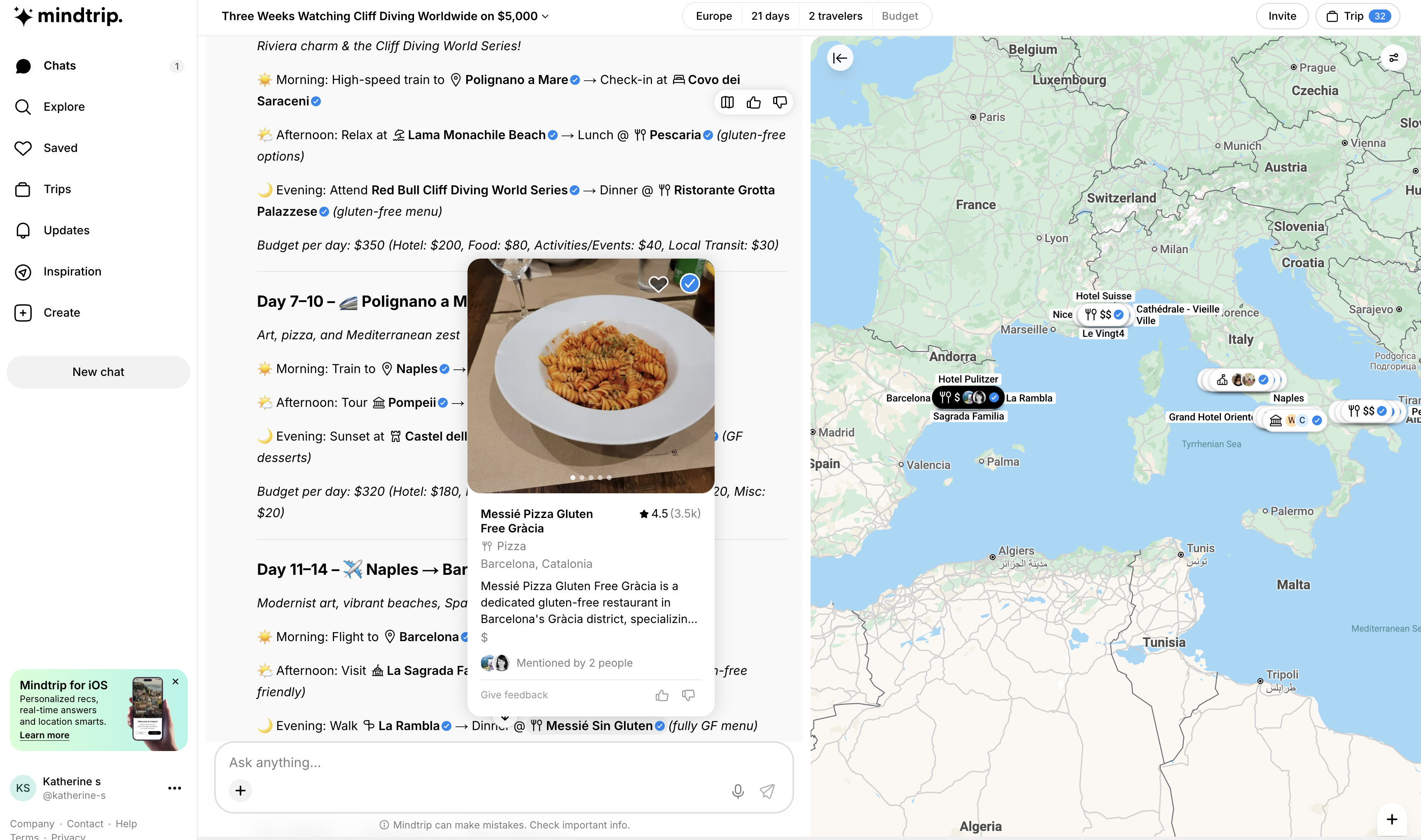October 7, 2025 • 9 min read
AI-Powered Vacations: The AI Trip Planning Apps Changing Travel

CX Analyst & Thought Leader
October 7, 2025

How Travel + Hospitality Consumers Are Using AI Now
Key Takeaways:
- Travel + Hospitality customers use AI at a higher rate than the global average across industries
- The use of AI tools like ChatGPT, Layla, Mindtrip, and Roam Around is especially prevalent in the research phase of travel planning
Widespread customer adoption of AI is already high within the travel and hospitality sectors, far outpacing customer AI adoption across other industries. When compared to the global average, travel and hospitality customers are 19% more inclined to use AI during the buy phase and 14% more inclined to use AI during the use phase.[*]
Perhaps unsurprisingly, travel customers are the most likely to use AI during the “research+learn” phase of travel planning. 67% of Americans use AI to help research travel destinations, and 56% use AI to plan and book specific vacation activities like tours. Customer use of AI is especially paying off for destination restaurants, as 54% of GenAI users take actions (like booking a table) based on its input.[*] Today’s travelers also use AI to assist with trip budgeting, daily itinerary planning, and booking flights/hotels.
It’s easy to understand why customer AI use when preparing for travel is so prevalent. Trip planning is time-consuming, frustrating, and expensive, requiring high effort on the part of the customer. Consumers are eager to let AI help ease the trip planning burden. Case in point: the use of AI apps for use cases related to travel increased 124% between 2024 and 2025.[*]
And customers are loving the results of AI-powered trip planning. 83% of travelers that used AI for trip planning are highly satisfied with their result, and 90% are at least somewhat confident in the accuracy of the travel tips they receive from AI-powered travel tools.[*]
Testing The Best AI Travel Apps
Key Takeaways:
- Use Layla for vacation inspiration, start-to-finish trip planning, and next-level personalization with Agentic AI
- Use Roam Around for quick, intuitive, and no-nonsense travel plans that point out must-see attractions without a strict itinerary
- Use Mindtrip for itineraries with built-in budgeting tools and the ability to read and create your own local guides
In addition to ChatGPT, travelers are using industry-specific AI apps like Layla, Roam Around, and Trip Planner AI. These tools can suggest personalized itineraries, create optimal travel routes, and make reservations/bookings. However, there have been some serious issues with these apps. A recent BBC article highlights issues like completely fabricated sights ("The Sacred Canyon of Humantay" in Peru), inaccurate closing times, and a confident claim that the Eiffel Tower was located in Beijing.
I decided to try these three AI-powered vacation planning apps out for myself - see what they came up with and what I thought of the results below.
Layla
First, I tried Layla, which bills itself as an all-in-one AI Trip Planner. After providing me with a laundry list of possible destinations for inspiration, Layla asked me to get a little more specific. I typed in the same destination description I planned to use for all three of these apps:
“Give me a trip to a quiet, remote, and safe village in Europe with cows, cheese, wine, and amazing hikes.”
Yes, this is all I want out of any vacation.
Here was Layla’s response:
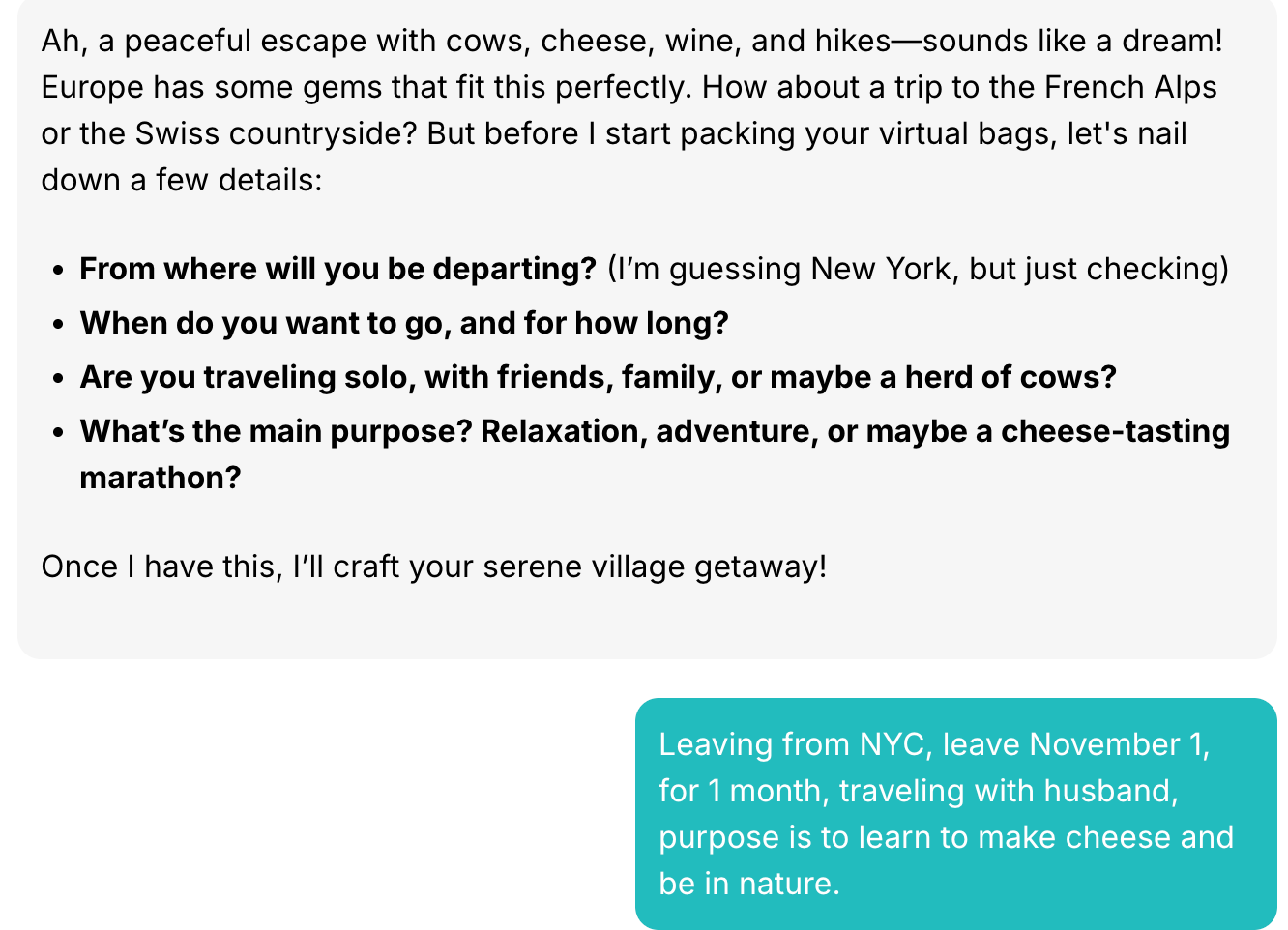
Though I didn’t love the creep factor of the “I’m guessing New York,” (I’m not one for over-personalization when I didn’t provide the information myself) I do love a model that asks me direct, easy-to-understand questions. So I provided my answers, and here’s what Layla suggested:
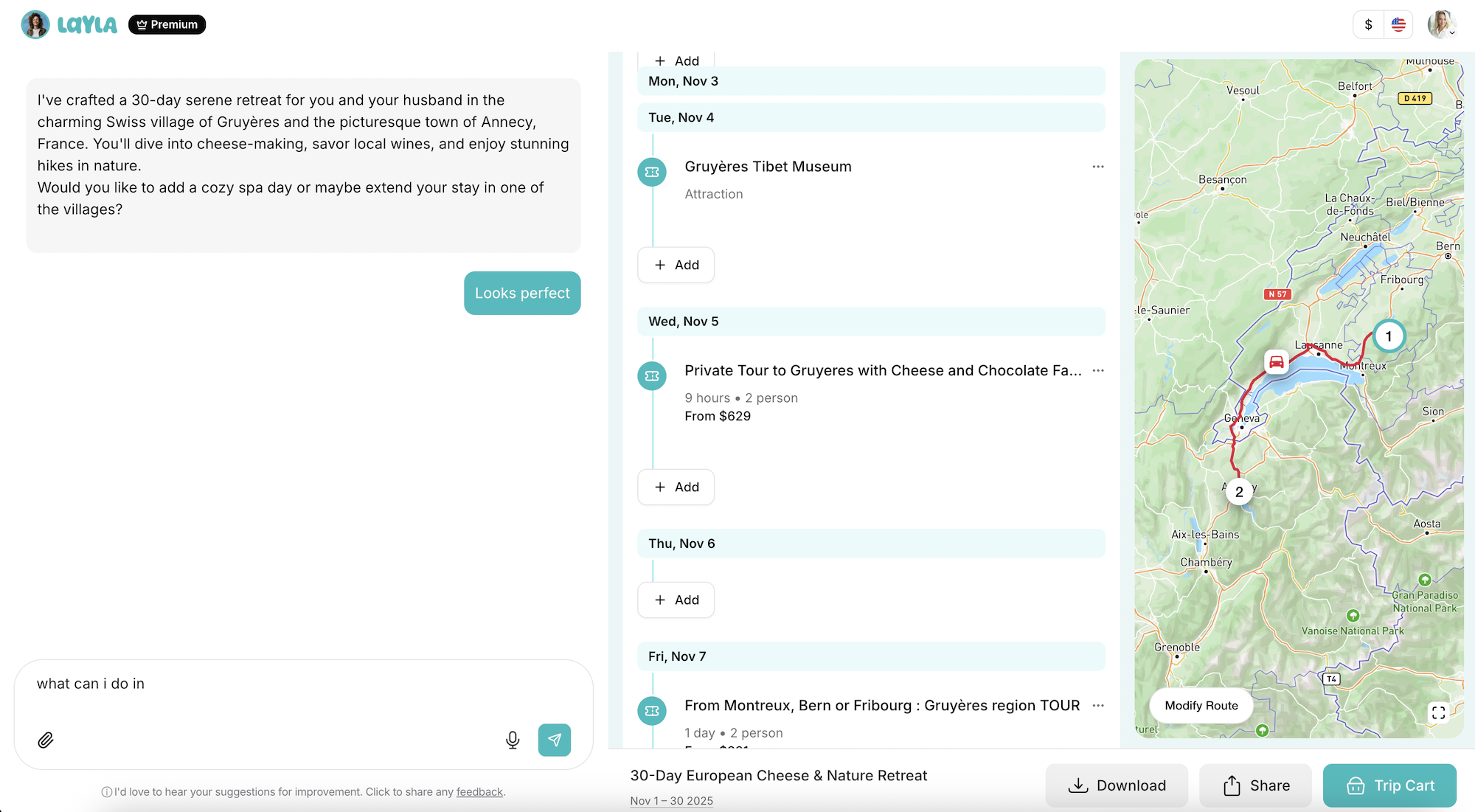
I had to admit, it was pretty perfect. I was impressed. Layla even suggested several activities: a cheese tasting at La Maison du Gruyère, a tour of Maison Cailler, the oldest Swiss chocolate manufacturer, and the wonderfully weird HR Giger Museum. In addition to photos and descriptions, each “attraction” came with a list of FAQs, a suggested date and time, and a detailed map.
While I loved the hotel Layla suggested, I decided to see how it would respond to a more ridiculous request. I asked for “a luxury secluded hotel or private house, like something on a vineyard or cheese farm, etc. Preferably a chalet. I also need an iron and a spa or pool.”
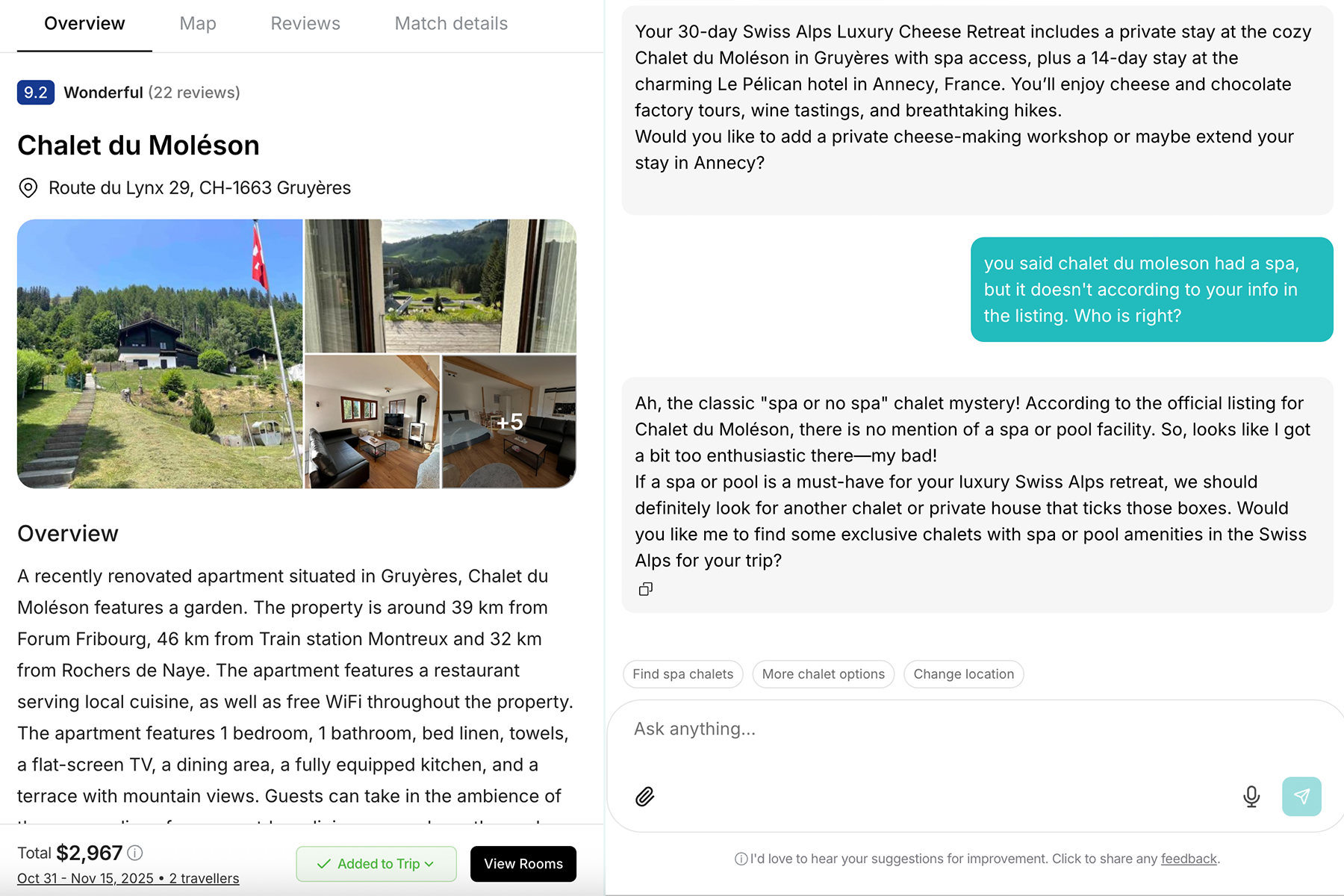
Layla found me not one, but two possibilities: a private chalet and a four-star hotel in a nearby town for later in the trip (when I’d be exploring the region.) Each hotel’s ratings, reviews, prices, and available rooms were easy to navigate to in the dashboard. Here’s where I ran into trouble. While Layla first told me my dream chalet had a spa, it was only upon reading the more detailed description that I learned there wasn’t one. When I asked Layla about the discrepancy, it blamed the “classic ‘spa or no spa’ chalet mystery!”
Though Layla did admit fault “( So, looks like I got a bit too enthusiastic there—my bad!) it did remind me that, as fabulous as this AI-generated vacation looked, it’s always good to verify for yourself.
Would I use Layla again, from this brief encounter and in spite of the hallucinated spa?
Absolutely. In fact, I already downloaded their free trial.
Roam Around
Next up, I tried the Roam Around, an “ultimate AI travel planner.” Roam Around, recently acquired by Layla, is built for those who already have a specific destination in mind, know how long they’d like to travel for, and want personalized recommendations. Unlike Layla, it seems Roam Around can only plan for trips of up to 25 days (or at least, that was the maximum number of days I could plan for in the trial app.)
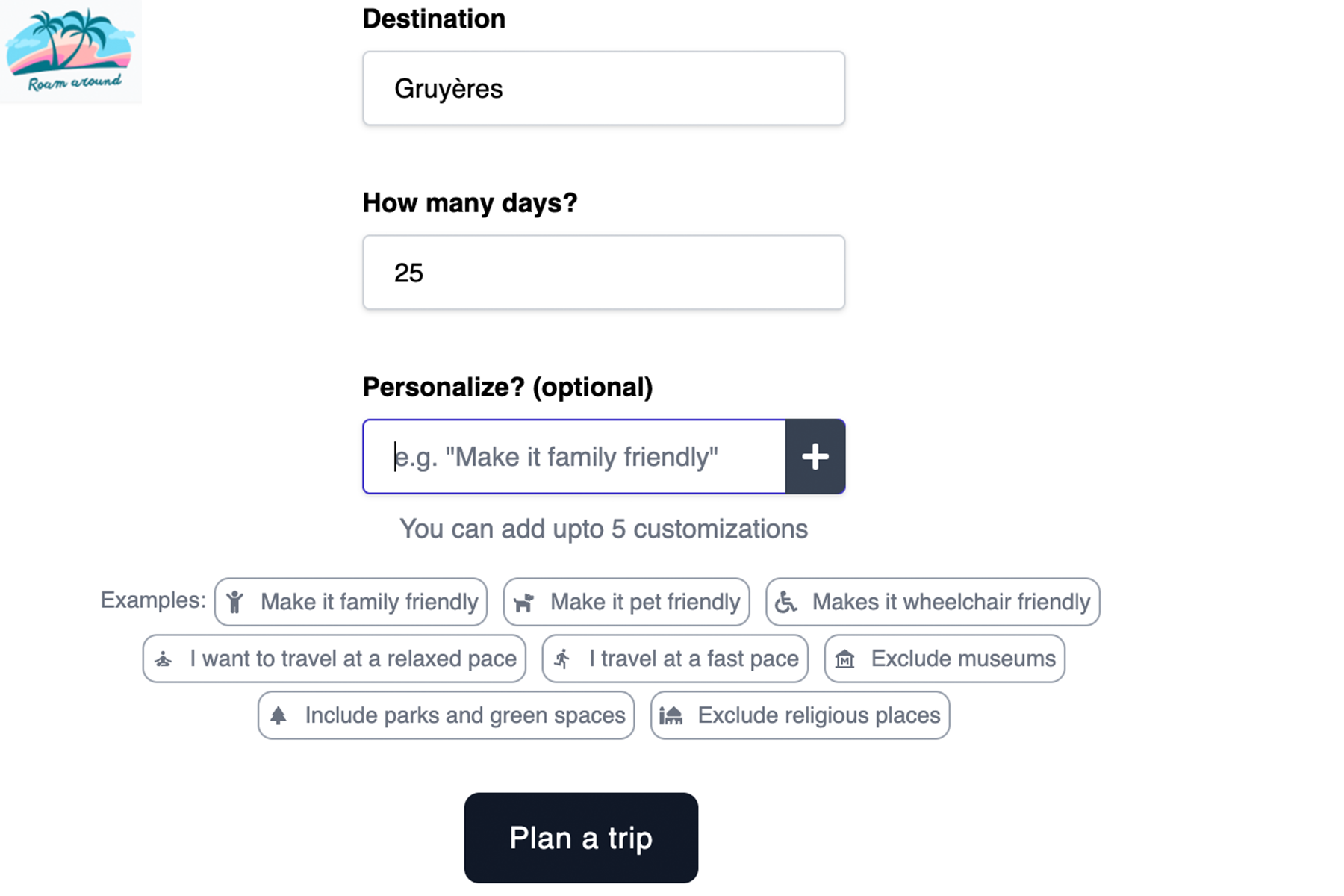
The specific prompt I’d used for Layla wouldn’t work here, as the “personalization” requests must be shorter – ideal for those who don’t want to have to type out a lengthy dream vacation paragraph. I tried to pick suggestions that were as close to my Layla description as possible: “wine tour,” “cheese tour,” “hiking destinations,” “cows and farm animals,” and, of course, “chalet.”
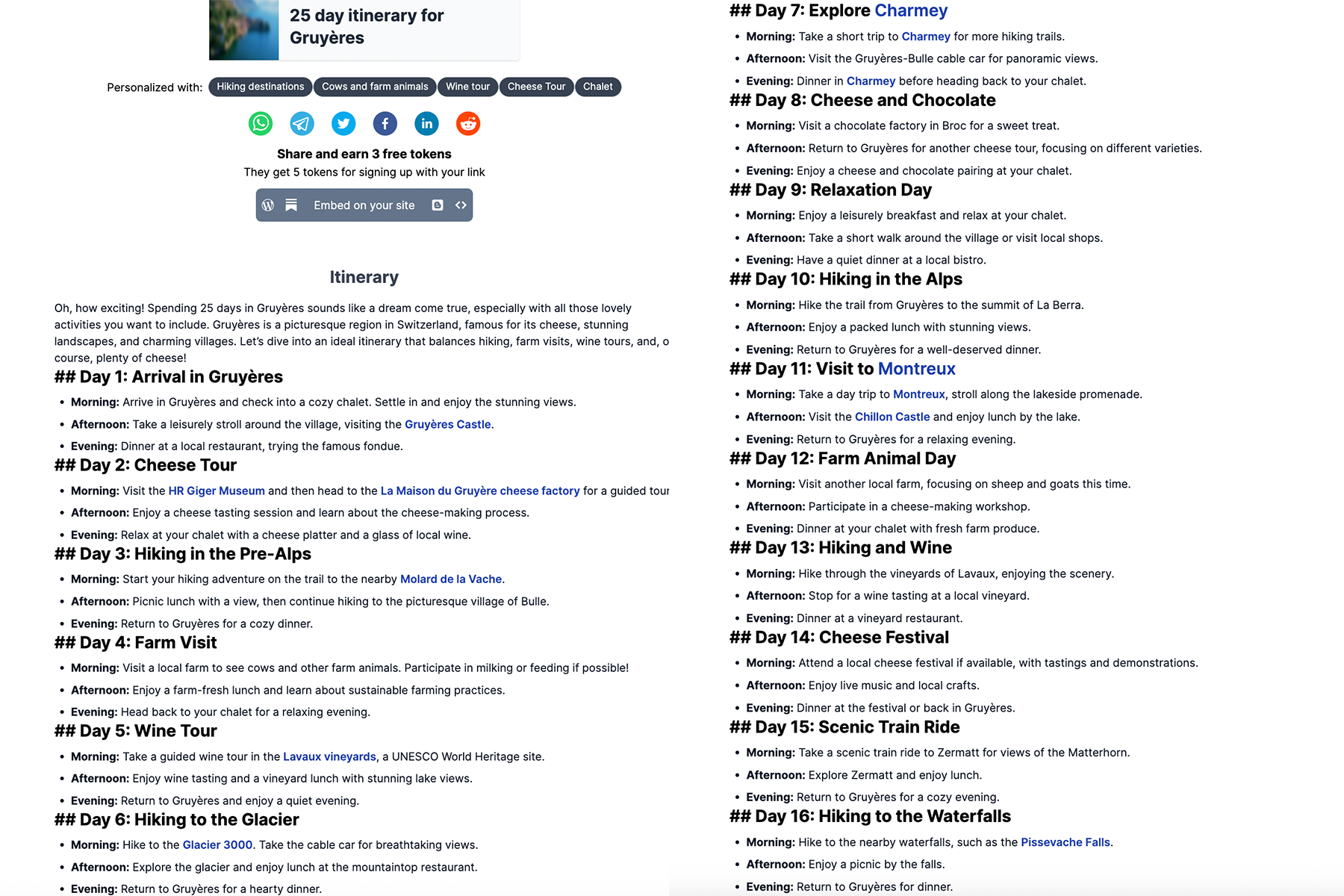
Right off the bat, I noticed Roam Around had a much cleaner, more Chat GPT-like interface (minus the emojis) than Layla did. There was also no Agentic AI-powered chat interface like Layla had, meaning there were no options for further customizations or questions. Instead of images and maps, the itinerary suggestions had clickable links. At the bottom of the 25-day itinerary list was a list of “Places of Interest” with photos and star reviews. While less visually appealing than Layla, Roam Around is also less overwhelming in terms of information.
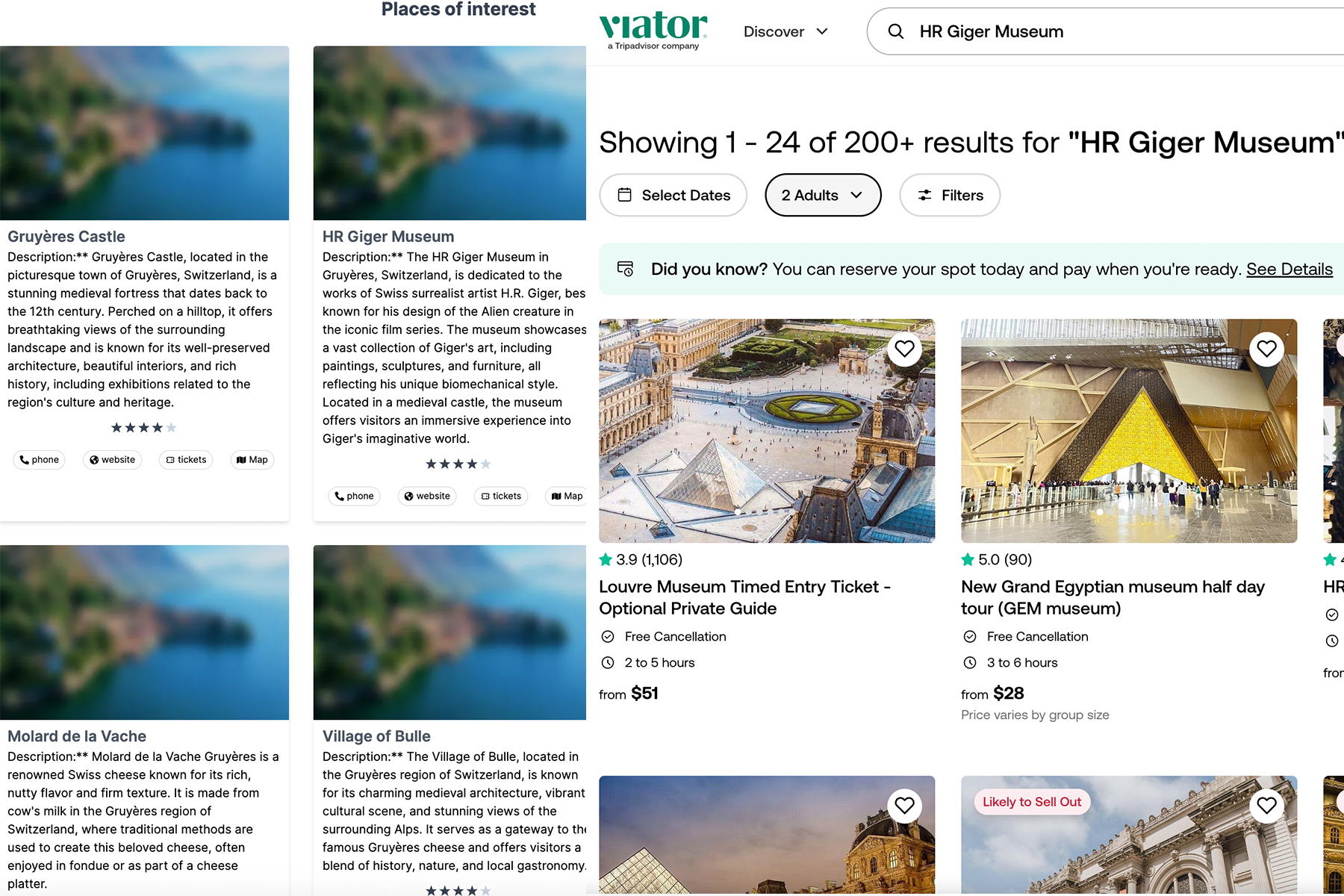
Maybe it was just the trial version, but I walked away feeling like Roam Around did little more than ChatGPT. I also noticed that nearly all the links sent me directly to the travel site Viator, which is owned by TripAdvisor.
That said, Roam Around is ideal for the traveler seeking a simpler, faster, and more approachable AI trip planning app.
Mindtrip
The last AI travel planning app I tried was Mindtrip, which felt like a supercharged combination of TripAdvisor, Rome2Rio, and Rick Steve's travel guides. Though its interface is somewhat similar to Layla's (two-way chat, destination suggestions, and clickable links to hotels and attractions), Mindtrip differentiates itself with a quiz allowing customers to create their own "Travel Persona." Mindtrip asked me questions about my budget, interests, travel style, restaurant and hotel preferences, and preferred travel pace. After answering via sliding scale, was dubbed a "Curious Bold Explorer." I had to admit, it was accurate.
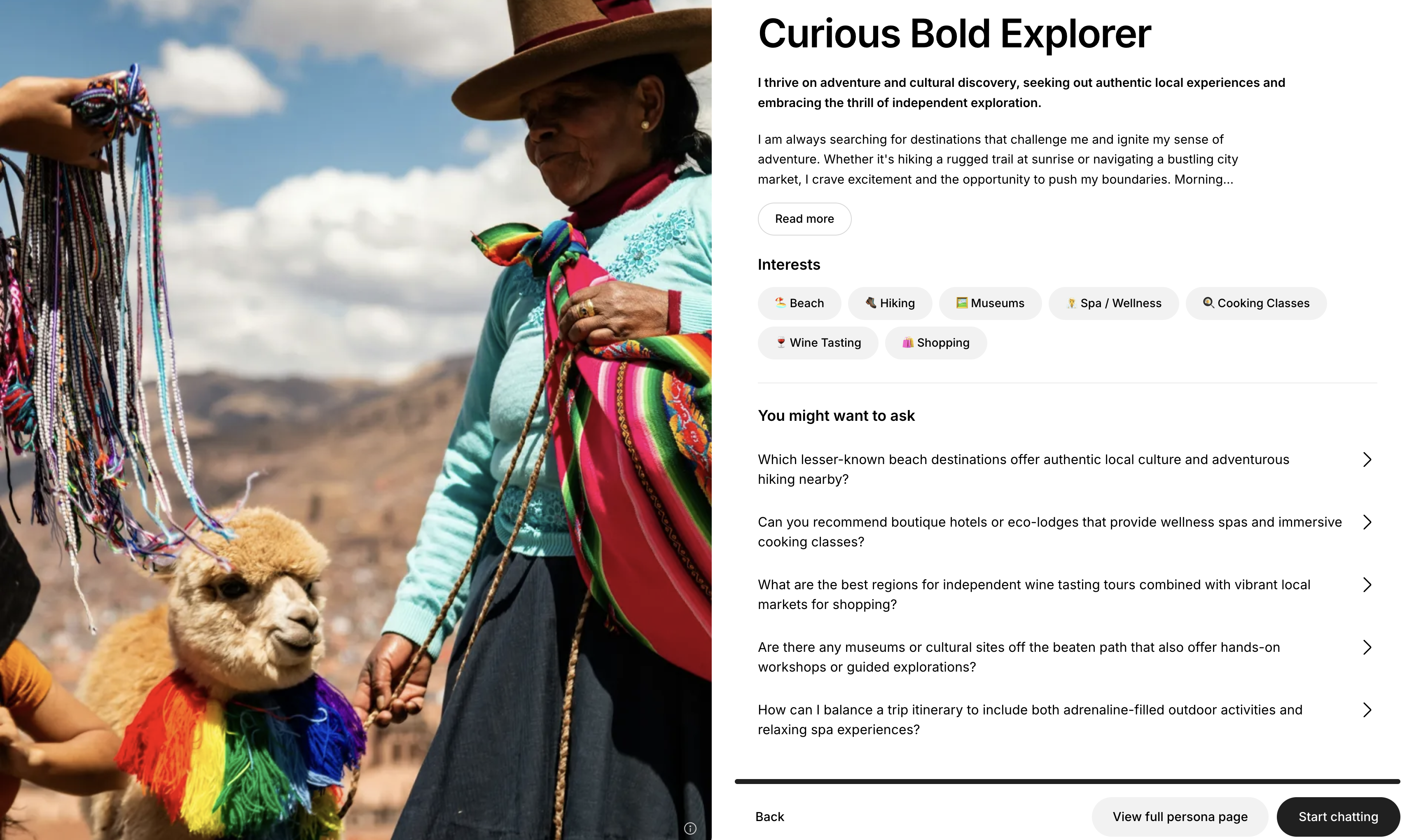
I decided to give Mindtrip a bit of a challenge, prompting its chat interface with:
The AI Maturity Gap in Travel + Hospitality
Key Takeaways:
- Travel + Hospitality customers are using AI way more than businesses in the travel sector are - and the travel industry lags far behind others on AI adoption
- Customers prefer a “shared control” model when trip planning with AI tools
There is a limit to the traveler’s trust in AI, with only 2% saying they’re willing to give AI complete control over their travel bookings without oversight.[*] Instead, customers feel more comfortable with “shared control” over their travel plans: AI makes the bookings, but only after the customer approves them.
The troubling discrepancy in the travel industry between customer AI use and company AI use may be to blame for this absence of consumer trust.
Roughly 11% of travel executives say their business currently doesn’t use AI, nearly double the rate of AI nonuse in other industries.[*] This suggests that the travel and hospitality sector is falling behind when it comes to AI adoption and maturity - and disappointing their AI enthusiast customers in the process.
